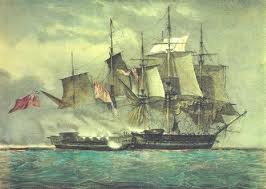Statistics. A lot of people don’t like them. A lot of people start to squirm when you bring them up.
Mostly, I think, because stats have his unseemly way of disproving our most favourite and cherished theories about our past.
But I do like statistics. I like the fact that they don’t have feelings. They’re not telling us stuff to make us look stupid or to be superior. Statistics just are.
We’re the ones who put the negative or positive spin on things and therefore either accept that maybe we’d got it a little bit wrong or else, as is more often is the case, someone stomps off in a hissy fit…Indeed, statistics are a prime illustration of Shakespeare’s statement, “There is nothing either good or bad but thinking makes it so.”
Anyway, ever since I read Andrew Lambert’s fine examination of the War of 1812 in The Challenge, I’ve been weighing up the statistical evidence about that conflict and its relative importance to the rest of the world circa 1812.
(I mean, I’ve heard it called the Second War of American Independence–and this alongside of claims that the Americans won it. Ehem.)
And it seems to me that at least part of the problem with understanding the Anglo-American conflict of 1812-1814 or even properly evaluating it, or indeed appreciating why it merits so little attention on the world stage, derives from a failure to appreciate the size and scale of the thing or a lack of context, if you will.
And the only way I know how to clear up this confusion is through a study of the stats.
 And this is where my liking of stats turns to love. Because, you see, they tell me all sorts of things I want to know. Scale, for example. For in this examination of the stats or facts, scale is most important.
And this is where my liking of stats turns to love. Because, you see, they tell me all sorts of things I want to know. Scale, for example. For in this examination of the stats or facts, scale is most important.
Because if one weighs the colonial cousins’ claims of battles won, or casualties, or costs against what else was happening at the same time..well, there’s only one way to describe the situation…they’re utterly dwarfed by the Napoleonic conflict which was raging on the Continent and to which the contretemps with America was only a side-show. And a tiny one at that.
But I don’t want you to take my word for it.
Let me illustrate what I mean.
Napoleon fought many great battles: Austerlitz, Jena, Wagram, Borodino, Leipzig, Waterloo. To name but a handful of the hundreds…(that’s right, hundreds…)
At Austerlitz on 2 December 1806, he and his 50,000 infantry and 15,000 cavalry took on the combined Russian and Austrian armies consisting of some 69,460 infantry and 16,565 cavalry.
Despite the odds against him, he won the day, losing in the neighbourhood of 10,000 troops to the Allies’ 16,000 dead and wounded and 20,000 captured. (Though some believe the numbers of Russian dead to have been in excess of 21,000.)
Do you see what I mean about the scale of the conflict? And that’s just one battle, one day’s action.
But let’s look at the year of 1812 itself.
When Napoleon crossed the River Niemen to invade Russia at the end of June 1812, he had some 550,000 troops (perhaps more), over 150,000 horses, and his private baggage train alone contained more than 100 vehicles with all the accoutrements of emperorship he thought he might need–silver, wines, books, posh outfits and uniforms, furniture, cooks with their saucepans, servants, china and crystal…
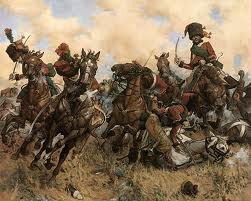 At the Battle of Borodino on the 7 September, between the Grand Armee and the Russian forces which faced them, there were some 200,000 men on the field that day.
At the Battle of Borodino on the 7 September, between the Grand Armee and the Russian forces which faced them, there were some 200,000 men on the field that day.
By evening, the French casualties stood somewhere between 28,000 and 35,000, and the Russians had lost between 38,500 to 58,000 casualties. (A year later, the corpses of 35, 478 horses were found and buried…)
So many lost and all on one day! And yes, those numbers are shocking! Horrifying even.
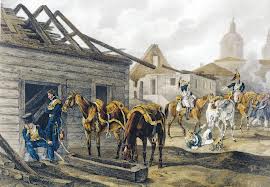 When he scurried back over the border in December 1812, Napoleon had lost all but some 30,000 survivors, plus all the booty he’d tried to pillage, plus that rather splendid baggage train full of imperial geegaws and only 500 horses or so made it back–and they, bless ’em, were as you will imagine no longer fit for service.
When he scurried back over the border in December 1812, Napoleon had lost all but some 30,000 survivors, plus all the booty he’d tried to pillage, plus that rather splendid baggage train full of imperial geegaws and only 500 horses or so made it back–and they, bless ’em, were as you will imagine no longer fit for service.
And despite his casual, criminal loss of so many of the finest troops and horses the world had ever seen–some half a million men–despite that, upon his return to Paris in December 1812, he set about raising a new Grand Armee of 350,000 troops.
The number, honestly, beggars belief! Can you imagine that many troops being marched all over the relatively small area of eastern France on their way to the front which would open up in Saxony in the spring of 1813?
 Now remind me, how many troops did the Americans send up to take Canada during the conflict of 1812? After an artillery bombardment, General Hull surrendered his 2500 American troops to the British General Brock and his 1300 Anglo-Canadian troops…
Now remind me, how many troops did the Americans send up to take Canada during the conflict of 1812? After an artillery bombardment, General Hull surrendered his 2500 American troops to the British General Brock and his 1300 Anglo-Canadian troops…
I hate to put it this way, but in terms of numbers, those stats put this in the realm of what in the European conflict of the day would be called ‘a skirmish’. Nothing more.
(Wellington lost 4500 men at the Siege of Badajoz in April 1812, in a space of just over 200 yards and in less than two hours fighting…)
Likewise, the naval battles of this 1812 sideshow (because that’s what it was) tell a similar story.
We think of the great battles of the age: the Battle of the Nile, the Battle of Copenhagen, the Battle of Trafalgar and what do we see? Fleets of ships fighting it out, blowing each other to smithereens for the supremacy of the seas.
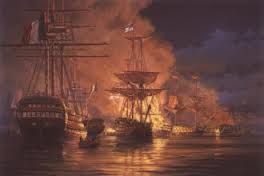 The Battle of the Nile saw 13 British ships of the line plus 2 other smaller vessels take on 13 French ships of the line, plus 4 frigates of which, by the battle’s end, only 2 ships of the line and 2 others escaped.
The Battle of the Nile saw 13 British ships of the line plus 2 other smaller vessels take on 13 French ships of the line, plus 4 frigates of which, by the battle’s end, only 2 ships of the line and 2 others escaped.
The Battle of Copenhagen saw the British fleet of 12 ships of the line plus six others take on a combined fleet of 24 ships of the line, plus over 11 others.
And the greatest victory, the Battle of Trafalgar, Nelson’s signature battle, saw 33 British ships (27 ships of the line plus 6 others) facing and defeating the combined French and Spanish fleets comprised of 41 vessels.
These are victories. Victories in what was an existential struggle against Napoleonic terror and despotism.
And against the kind of stakes for which the British and their allies were fighting against this Napoleonic military empire, a one-off battle between ill-matched opponents, such as the USS Hornet against the smaller British sloop Peacock just doesn’t merit a look-in.
And if you doubt me, just look at those numbers again. In all, some 5 to 6 million souls died in Napoleon’s wars of conquest and loss–and that’s not counting the refugee crisis, nor the overall loss of life due to starvation or disease which the presence of such vast armies living off the land caused. (Frankly, it’s impossible to know how many thousands and thousands of peasants died during Napoleon’s invasion of Russia, for example…)
And that’s nearly the entire American population in 1812…
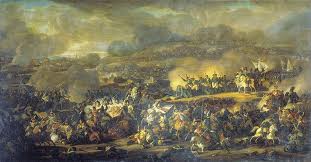 So before anyone comes after me to insist on the awesomeness of the firewall at New Orleans, or the brilliance of American ship-building at the time (the French were also building very sea-worthy vessels at the time…) remember I’m going to cite the torching of Smolensk, the bombardment of Vienna, the sieges of Acre, Badajoz and Ciudad Rodrigo, the conflagration of Moscow, the three-day battle of Leipzig…and all those friendly stats that I love so much.
So before anyone comes after me to insist on the awesomeness of the firewall at New Orleans, or the brilliance of American ship-building at the time (the French were also building very sea-worthy vessels at the time…) remember I’m going to cite the torching of Smolensk, the bombardment of Vienna, the sieges of Acre, Badajoz and Ciudad Rodrigo, the conflagration of Moscow, the three-day battle of Leipzig…and all those friendly stats that I love so much.


